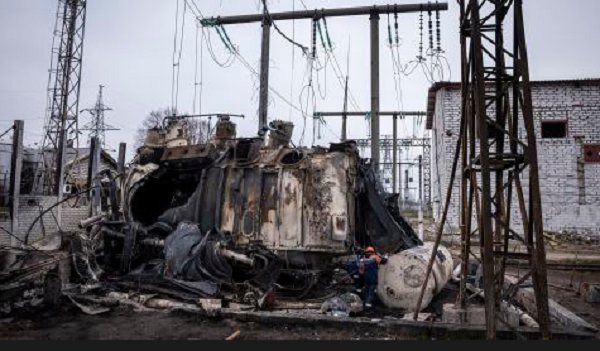Russia destroyed Ukraine’s largest hydroelectric power plant in a massive attack
Russia launched a massive attack on Ukrainian cities Friday morning, marking the largest recent strike on energy infrastructure, which targeted Ukraine’s largest hydroelectric power plant. Residential buildings across the country were also damaged or destroyed.
As Russia intensifies attacks, the Kremlin says that Russia is in a “state of war,” a significant departure from previously describing its full-scale invasion of Ukraine as “a special military operation.” The Financial Times reported that Kremlin spokesperson Dmitry Peskov told a local Russian newspaper that it started as a special military operation but as soon as the West started participating in the conflict on the side of Ukraine, it became a war.
Ukrainian President Volodymyr Zelensky said Russia fired more than 60 “Shahed” drones and nearly 90 rockets of different types at Ukraine Friday morning while criticizing Western allies for delaying the delivery of crucial aid needed for the country’s defence. He said on social media that there are no delays in Russian missiles striking Ukraine.
“‘Shahed’ drones do not have indecision, like some politicians. It is important to understand the cost of delays and delayed decisions,” he said, adding that air defence is needed to protect people, infrastructure, houses and dams.
Air Force Commander Lieutenant-General Mykola Oleschuk said on Telegram that air defence destroyed 37 rockets and 55 Shahed drones. He said in addition to Russia striking with Shahed drones, it used “Iskander-M” ballistic missiles, cruise missiles, “Kinzhal” aeroballistic missiles, guided air missiles and anti-aircraft guided missiles.
Friday morning’s onslaught of drones and missiles is the second large attack this week. Russia unleashed its largest missile attack in weeks on Kyiv and the surrounding region on Thursday morning, injuring at least 17 people.
Energy minister Herman Halushchenko called Friday’s attack the largest attack on Ukrainian energy in recent times.
“The goal is not just to damage, but to try again, like last year, to cause a large-scale failure of the country’s energy system,” he said.
Mr. Halushchenko wrote on Facebook that there has been damage to power generation facilities, transmission and distribution systems and one of the power transmission lines feeding the Zaporhzhzia Nuclear Power Plant was cut off.
UKRHYDROENERGO, Ukraine’s main hydropower generating company, said the Dnipro hydroelectric power plant in Zaporizhzhia was hit. They said in a statement posted on Facebook that Russian “terrorists” did not calm down after destroying the Kakhovka dam and are now trying to create a new environmental disaster by “cynically attacking the Dnipro HPP’s hydraulic structures and dam.”
There is a fire at the plant, the company said, and emergency services and power engineers are working on the site. There is no threat of a break through, the statement added; the situation at the plant’s dam is under control.
Oleg Sinegubov, the head of Kharkiv Regional Military Administration, said more than 15 Russian strikes targeted energy facilities there and the city is almost completely without light.
Ukrainian officials said that civilians were injured and killed following Russia’s Friday morning attack, which targeted Zaporhzhzia, Khmelnytskyi, Odesa, Dnipropetrovsk, Poltava, Mykolaiv, Vinnytsia, Lviv and Ivano-Frankivsk regions and destroyed residential buildings. They are still assessing the toll.
Anatolii Kurtiev, acting head of Zaporizhzhia city council, said on Facebook that currently two people are considered missing, including a child, and six people require medical help but search and rescue operations are ongoing. Mr. Kurtiev said more than 150 buildings, including private homes and multi-storey buildings, were damaged. Two houses were completely destroyed. The survey of the damage is ongoing.
With reports from Kateryna Hatsenko.
This article was first reported by The Globe and Mail















